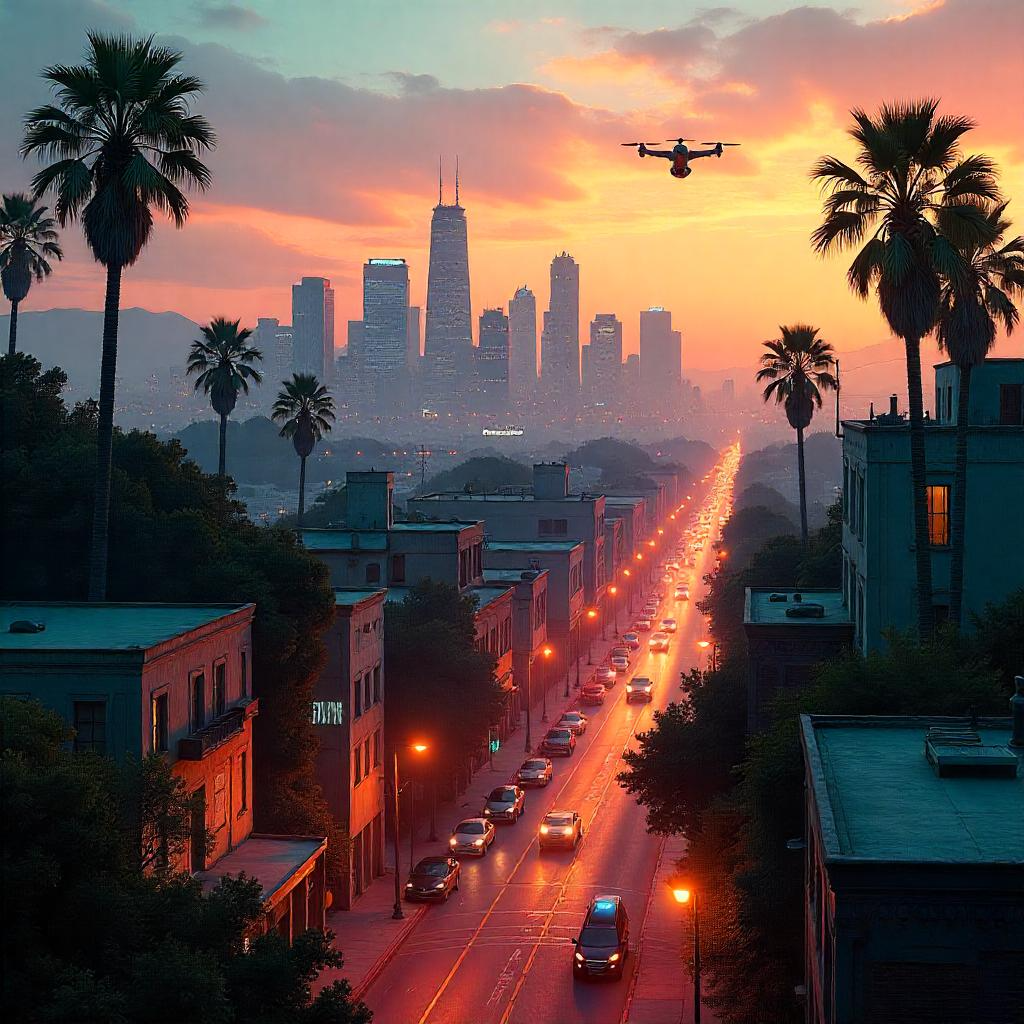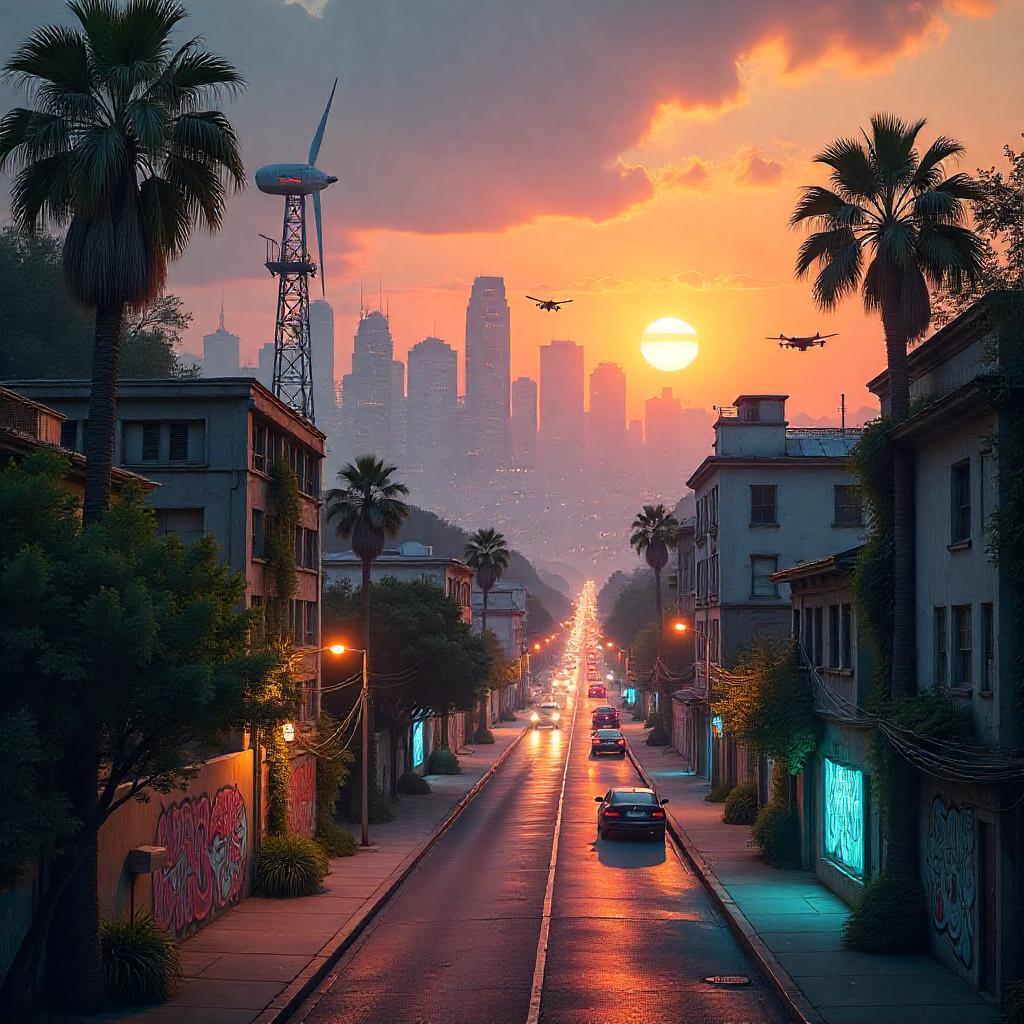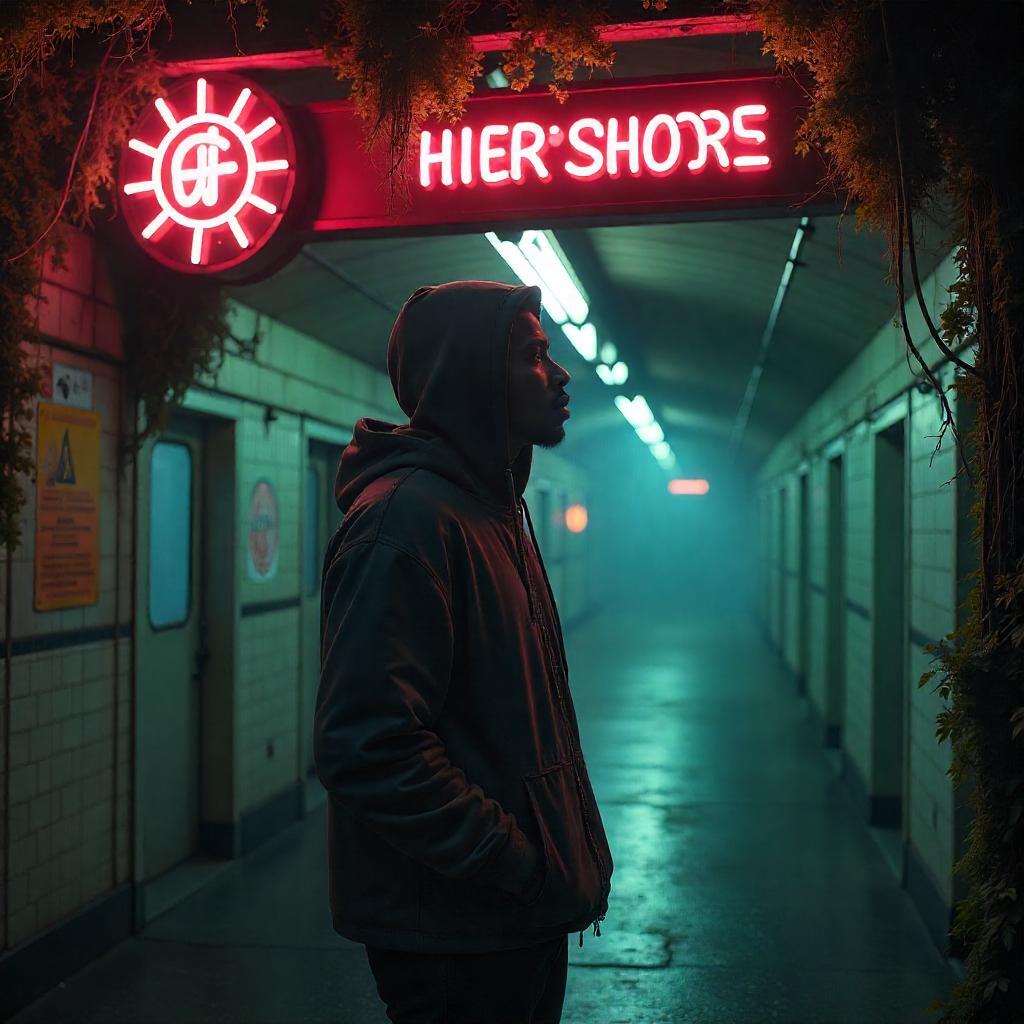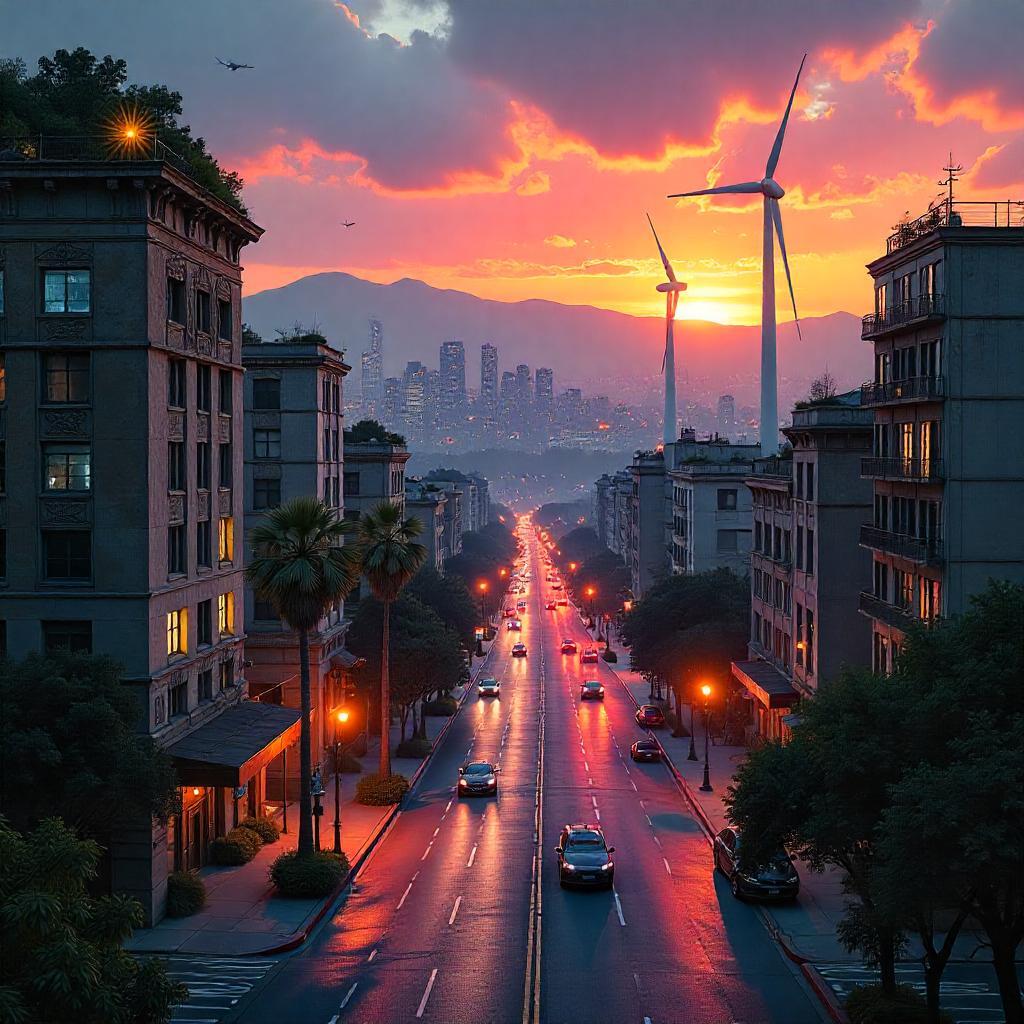Lords of the Fifth Beat from Sol-Angeles - Elfpunk / Mythpunk / Musical Sci-Fantasy

Prologue – The Last Verse Before the Rift
The city sang.
Not with sirens or traffic, but with rhythm—ancient, broken, remixed. Solar mirrors shimmered high on the rooftops, casting daylight through clouds stitched together by digital fog and low-frequency chant. Below, Los Angeles no longer resembled the old world. It had become something stranger: a mythpunk sprawl of rune-graffiti, spirit-buses, glowing fungus gardens, and streetlights powered by prayer.
This was Sol-Angeles now.
And the veil was thinning.
Everyone could feel it. In the bassline of the breeze. In the dreams people started having—visions of dragons in bullet trains, ancestors whispering through cracked earbuds, the Bifrost shimmering faintly in the LA River at sunset.
Magic had returned. Not in silence, but in verse.
At first, it was subtle. Ciphers in alleys that cracked concrete. Beats that healed wounds. MCs who rapped down surveillance drones with a single couplet. But then came the creatures—Norse frost giants stomping through Skid Row like displaced gods, Aztec jaguar spirits riding MTA trains, and Orishas haunting data streams like trickster ghosts.
And at the center of it all: Mack Tales.
Known in the cipher as The Fifth Voice, Mack wasn’t just another battle rapper. He was a magis—one of the few who could channel myth through rhyme, draw ancestral power through flow. His bars weren’t just verses—they were weapons. Spells. Revolutions.
And he wasn’t alone.
A new pantheon had formed:
- Gandalf the Gray-Scale, remixed and street-bound, staff now a beatstick, voice deeper than sub-bass, cloaked in tattered Jordans and wisdom.
- Ix Chel the Ciphermoon, a Mayan MC whose verses bent light and cycle.
- Ogun Da Mic, a Yoruba blacksmith of rhyme, hammering beats into reality with warlike precision.
- Saraswati-808, goddess of melody, who turned ragas into coded spells layered in synths and sitars.
They were the Lords of the Fifth Beat.
The city had become a threshold. A remix. A liminal soundscape where gods, ghosts, and rebel MCs battled not just for domination—but for the right to remake Earth through sound.
Because the Fifth Beat wasn’t just a rhythm. It was a realm.
And the only way through... was freestyle prophecy.
Lords of the Fifth Beat

In the myth-soaked ruins of future Solarpunk Los Angeles—now called Sol-Angeles—rhythm is power. Streetlights run on sunlight and syncopation. Graffiti pulses with runes. Reality bends at the beat. And magic flows not through wands or staffs, but through bars—verses wrapped in ancient lineages, spit into the air like spells.
Mack Tales, known on the streets as The Fifth Voice, is no ordinary MC. He's a magis, a wizard of rhythm, who rhymes with the spirit of ancestors and the hunger of a new Earth. Alongside him, a crew of lyrical demigods known as the Lords of the Fifth Beat hold court above the rooftops of a city caught between prophecy and apocalypse.
One night, at a cipher beneath the great solar tree, the Veil tears open—and through it steps a storm of frost giants speaking ancient Norse rap, stomping through Skid Row like a broken god’s bassline. The Lords meet them in verse, unleashing counterflows that bend time, crack ice, and protect the people.
But the battle is only a preview. A deeper silence looms—the work of a hidden force known as The Silent Producer, a being that erases culture by erasing rhythm itself. Through engineered silence, they infect realms and erase memory.
To stop them, the Lords descend into the Echo Bazaar, a forgotten subway-turned-sonic-market, where lost songs echo in loops and unfinished bars haunt the walls. There, the crew meets the Oracle of the Lost Hook, a glitching goddess of abandoned verses. Mack faces his own shadow track—his unspoken pain, his hunger for truth—and emerges with part of a legendary verse.
The Fifth Beat, the song that can reforge the world.
The final battle erupts above Sol-Angeles on a floating stage made of sound. The Silent Producer rises—faceless, devouring, anti-music incarnate. The Lords rap not for dominance, but for memory, for myth, for survival.
As their flows merge—Mayan, Yoruba, Norse, Vedic, and underground L.A.—the Fifth Beat awakens. It rips through the city like sacred thunder, rewrites its skyline into glowing syllables and divine structures.
Sol-Angeles becomes Lyricara—a realm of walking stories and living rhyme.
Mack Tales stands at its center, staff-mic raised, eyes on the horizon.
“We don’t just rhyme to resist,” he says.
“We rhyme to rebuild.”
--
A SECOND MACK TALES SHORT STORY
Prologue – Beneath the Neon Skin

Los Angeles didn’t burn when it ended.
It glowed.
After the oceans rose and the wildfires sang their final chorus, after the towers fell and the money turned into wind, the city wasn’t gone. It just changed frequencies. It shed its old skin like a serpent and grew one made of solar light, bioluminescent moss, data-vines, and code.
The new city was called by many names—Neo-Angeles, Solar L.A., or just The Grid—but the old spirits still whispered one name beneath all the circuitry:
Mythos.
Most didn’t hear them. They were too busy living inside branded dream-loops or selling memory fragments for followers. But some still listened. Especially when the beat hit just right.
Because in this city, sound wasn’t just music. It was structure.
Beats held buildings upright. Flow kept the traffic moving. Verse could heal, or glitch, or summon something no one could explain. And deep below the layers of synth and smog, under the terraformed gardens and glowing billboards, the city still hummed with a pulse older than any machine.
Mack Tales felt that hum in his bones.
He was raised in the Dust Zones, where old-world concrete cracked like clay and only the boldest spit rhymes loud enough to keep their houses standing. He didn’t have magic—not at first. Just rhythm. And rage. And the kind of hunger you can’t name in polite conversation.
But one night, under a broken streetlamp flickering like a candle in a temple, he rapped the verse that changed everything.
The sky blinked.
Time skipped.
And the spirits answered.
Not with words—but with harmonies. Fractured fragments of forgotten gods, street saints, ancestral echoes encoded in static. They wrapped around him in loops and reverb, weaving his voice into the forgotten timeline of Earth. He didn’t know it then, but he had cracked open a mythic breach—a glitch between realities, where the old world of gods and the new world of code overlapped.
Now, they call him The GOD MC.
But Mack didn’t choose that title. The city did.
And the city is ready to rise again—not as a sequel, but as a remix. A Fifth World built not from concrete or control, but from story, rhythm, and living memory.
The verse is ancient.
The mic is sacred.
And the drop... is coming.
Neon Mythos: Rise of the GOD MC

Solarpunk Magical Realism / Cyber-Folklore Short Story
Los Angeles didn’t fall.
It evolved.
After the ecological collapse, it reemerged as Sol-Angeles—a neon-soaked jungle of mossy towers, solar domes, and ancestral data laced through old fiber lines. The bones of the city still held stories. But deeper than that, beneath the cracked pavement and recycled skylines, there pulsed a rhythm no algorithm could track.
Some called it noise.
Others called it myth.
But to Mack Tales, it felt like home.
He grew up in the Dust Zones, where the old world coughed up concrete and the only thing more dangerous than silence was a verse spit too loud. Mack was just another underground MC trying to keep his people’s memory alive—until the night he dropped the wrong verse in the right cipher.
A subway station. Midnight.
An open mic battle of broken gods and street prophets.
When Mack rapped, the air cracked. Symbols glowed midair. Time glitched.
A mythic echo rose from beneath the rails—an ancestral signal laced with static and gold. It whispered through him: You’ve sung the breach. The Fifth World stirs.
From that moment, nothing was the same.
Across the city, glitching spirits appeared in vending machines. Solar panels hummed forgotten hymns. And in his dreams, Mack saw cities made of rhythm and trees, floating above timelines stitched together with verses.
Guided by Tía Numina, a retired sound-engineer turned cyber-mystic, Mack descended into the Memory Labyrinth—a half-wild data vault where abandoned songs grew like vines. There, he uncovered an ancient mythos encoded in corrupted files: a prophecy of the Fifth World—a luminous realm where myth, tech, and rhythm existed as one.
But knowledge came with consequence.
To claim the path forward, Mack had to face the Trial of Static: a realm where his voice was stripped, where suppressed cultures cried without sound, where silence grew like mold. It was there, in the absence of rhythm, that he remembered the lullabies of his mother, the chants of protestors, the drumline of survival.
He spoke again—not with ego, but with purpose.
And the silence shattered.
His voice reawakened Mythos, the city’s sleeping soul. It surged through the streets, turning power lines into prayer lines, bus stops into altars. Others joined him—storytellers, street poets, beatmakers, spoken-word witches. Together, they formed the first global harmonic convergence.
And at the center of it all, beneath a stage made of memory, root, and reverb, Mack performed the Fifth Verse—the final song that fused timelines and mythologies into one collective future.
The old city faded.
What rose in its place was not Sol-Angeles, not even Earth as it had been.
It was Lyricara—a Fifth World woven from verse, built by ancestors and remixed by visionaries. A realm where stories breathed and rhythm ruled.
Mack didn’t stay.
He became the first Myth Architect, encoded into the city’s pulse. His voice now lives in every echo between buildings, in every child’s first freestyle, in every storm that drops with a beat.
The GOD MC didn’t save the world.
He rewrote it.